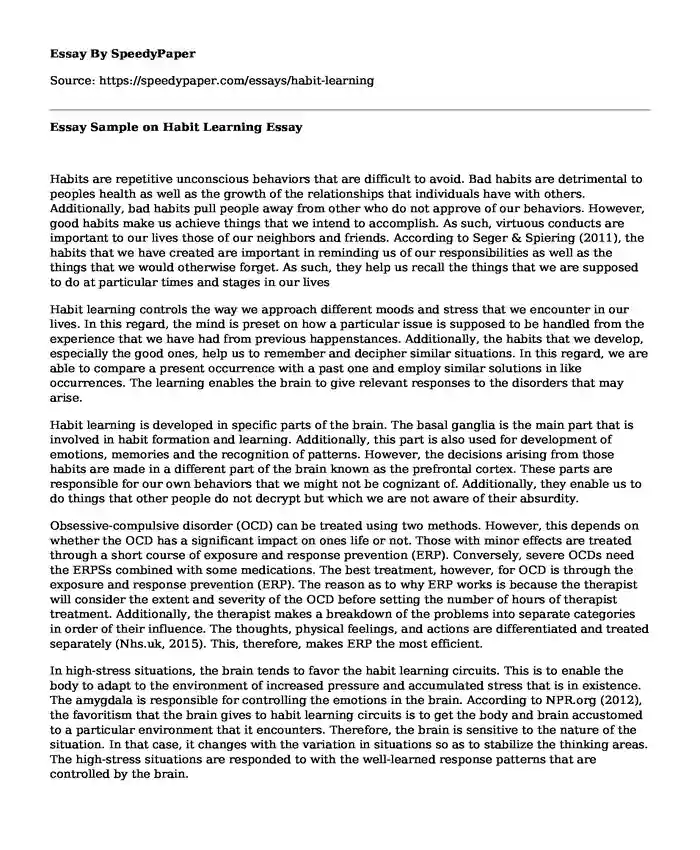
| Type of paper: | Essay |
| Categories: | Psychology |
| Pages: | 3 |
| Wordcount: | 638 words |
Habits are repetitive unconscious behaviors that are difficult to avoid. Bad habits are detrimental to peoples health as well as the growth of the relationships that individuals have with others. Additionally, bad habits pull people away from other who do not approve of our behaviors. However, good habits make us achieve things that we intend to accomplish. As such, virtuous conducts are important to our lives those of our neighbors and friends. According to Seger & Spiering (2011), the habits that we have created are important in reminding us of our responsibilities as well as the things that we would otherwise forget. As such, they help us recall the things that we are supposed to do at particular times and stages in our lives
Habit learning controls the way we approach different moods and stress that we encounter in our lives. In this regard, the mind is preset on how a particular issue is supposed to be handled from the experience that we have had from previous happenstances. Additionally, the habits that we develop, especially the good ones, help us to remember and decipher similar situations. In this regard, we are able to compare a present occurrence with a past one and employ similar solutions in like occurrences. The learning enables the brain to give relevant responses to the disorders that may arise.
Habit learning is developed in specific parts of the brain. The basal ganglia is the main part that is involved in habit formation and learning. Additionally, this part is also used for development of emotions, memories and the recognition of patterns. However, the decisions arising from those habits are made in a different part of the brain known as the prefrontal cortex. These parts are responsible for our own behaviors that we might not be cognizant of. Additionally, they enable us to do things that other people do not decrypt but which we are not aware of their absurdity.
Obsessive-compulsive disorder (OCD) can be treated using two methods. However, this depends on whether the OCD has a significant impact on ones life or not. Those with minor effects are treated through a short course of exposure and response prevention (ERP). Conversely, severe OCDs need the ERPSs combined with some medications. The best treatment, however, for OCD is through the exposure and response prevention (ERP). The reason as to why ERP works is because the therapist will consider the extent and severity of the OCD before setting the number of hours of therapist treatment. Additionally, the therapist makes a breakdown of the problems into separate categories in order of their influence. The thoughts, physical feelings, and actions are differentiated and treated separately (Nhs.uk, 2015). This, therefore, makes ERP the most efficient.
In high-stress situations, the brain tends to favor the habit learning circuits. This is to enable the body to adapt to the environment of increased pressure and accumulated stress that is in existence. The amygdala is responsible for controlling the emotions in the brain. According to NPR.org (2012), the favoritism that the brain gives to habit learning circuits is to get the body and brain accustomed to a particular environment that it encounters. Therefore, the brain is sensitive to the nature of the situation. In that case, it changes with the variation in situations so as to stabilize the thinking areas. The high-stress situations are responded to with the well-learned response patterns that are controlled by the brain.
References
Seger, C., & Spiering, B. (2011). A Critical Review of Habit Learning and the Basal Ganglia. Front. Syst. Neurosci., 5. http://dx.doi.org/10.3389/fnsys.2011.00066
NPR.org,. (2012). Habits: How They Form And How To Break Them. Retrieved 6 November 2015, from http://www.npr.org/2012/03/05/147192599/habits-how-they-form-and-how-to-break-them
Nhs.uk,. (2015). Obsessive compulsive disorder (OCD) - Treatment - NHS Choices. Retrieved 6 November 2015, from http://www.nhs.uk/Conditions/Obsessive-compulsive-disorder/Pages/Treatment.aspx
Cite this page
Essay Sample on Habit Learning. (2020, Aug 13). Retrieved from https://speedypaper.com/essays/habit-learning
Request Removal
If you are the original author of this essay and no longer wish to have it published on the SpeedyPaper website, please click below to request its removal:
- Free Essay Sample on Place Attachment
- 800 Word Essay Sample: Writing Guide and Free Samples
- The Big Sleep - Free Essay with a Movie Review
- Innovation Trends in Sporting Events, Free Essay Example
- Essay Sample on Ethical Issues in the Workplace
- Essay Example. Race for Solar Power in Africa
- Essay Sample on Issues Affecting International Trade
Popular categories




